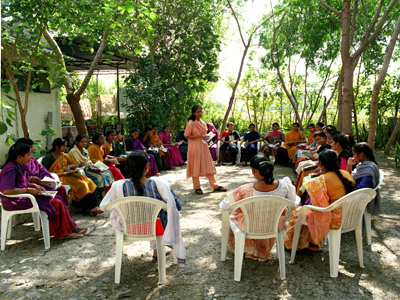
A session at the Barli Development Institute for Rural Women in Indore, India
© Bahá'í International Community
Social and Economic Development
The Bahá'í Faith teaches that effective social and economic development can only come about when the twin principles of the oneness of mankind and the essential spiritual nature of mankind have been universally accepted. Everyone should receive education so that they can develop their individual talents and skills in a fashion that will satisfy their own needs as well as those of the society to which they belong. The Bahá’í Faith recognises that while absolute equality is undesirable and ultimately unattainable, society must intervene where extremes of wealth and poverty occur to prevent unnecessary suffering. Some of the approaches that the Bahá'í community adopts in its efforts to contribute to social and economic development include: seeing people as resources, not problems; recognition of the nobility of the human being; avoidance of pre-packaged solutions; and raising the capacity of individuals and communities to participate in the generation and application of knowledge.
Ready for more?
not all...
quizzers. Try to win a coveted spot on our Hall of Fame Page.







